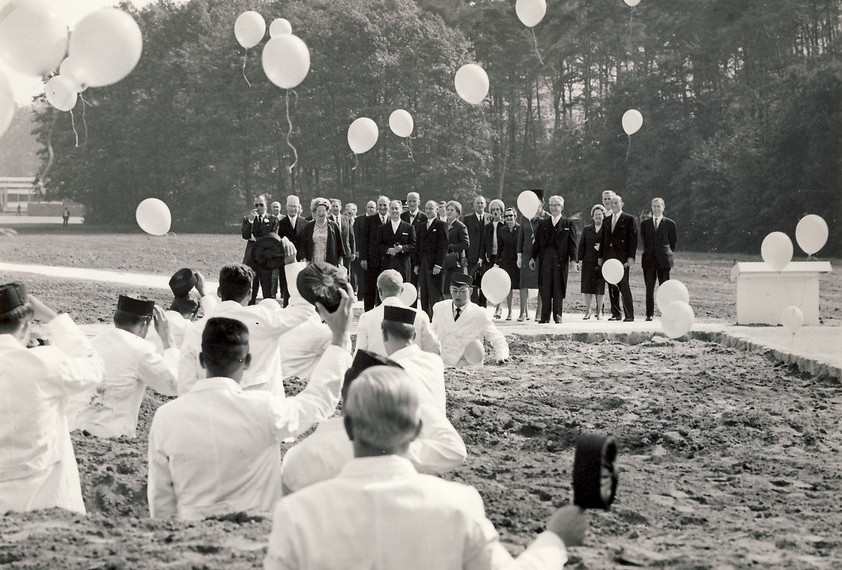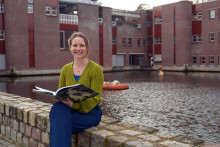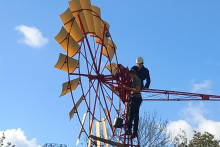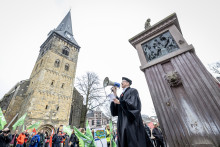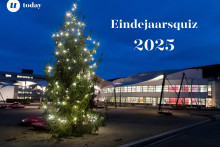‘In 1969, seventeen girls arrived at Twente Technical College (THT), which was considered ‘quite a lot’ at the time. Most of them wanted to study mathematics, but I, together with my fellow student Sjoukje, opted for Chemical Engineering. All seventeen of us lived together in one flat. I liked living with other girls. Together we learned to make chilli con carne and drink cheap rosé. We bought a treadle sewing machine and made trendy clothes for ourselves in the common room. We also played plenty of sports. We wanted to play hockey, but couldn’t find enough girls to form a team, so we decided to play volleyball instead. You only needed six players for that.’
Hockey stick
This is just a snippet from the story of Annemie Bongers, who grew up in Maastricht. Her mother was the one who suggested that she should go and study in Enschede. Not so much because she herself was from there but because she thought the campus would be a safe place for her daughter to study. The campus of a still very young technical college, with seventeen female students at the time, all living in the same flat. It was a very pleasant environment for Bongers, but the ‘man’s world’ she found herself in could also be confrontational at times.
noteworthy examples
Academic heritage at the UT comes in all shapes and sizes, from campus art and architecture to association almanacs. Below are some noteworthy examples:
- The Ampère Foundation: From the attic of the Carré building, a group of former employees manages the historical study collection of the Faculty of Electrical Engineering, Mathematics and Computer Science, with shelves full of measuring equipment, amplifiers, old PCs and oscilloscopes.
- The paper archive of THT-Nieuws/UT-Nieuws (now U-Today) - from 1963-1995 - has been completely digitised. Thousands of pages of university news were scanned and handed over to the Historical Centre Overijssel.
- In 1999, Dr J.A.P.G. Boot (1905-2006) gifted the university library a collection (about 16,000 volumes) on the history of the Twente textile industry as well as a collection of sixteenth- and seventeenth-century city books, including a Blaeu atlas.
- And finally, a relatively new form of presentation: this year, U-Today created a three-part podcast called ‘Landgoed Drienerlo’, a quest to uncover the mysterious role of Drienerlo estate owner Gerrit Albertus Lasonder, an NSB member who helped Jews go into hiding.
‘I never experienced any MeToo incidents. I didn’t hear about them from others either. But I did find it confronting how male students viewed us at the time. Now I think part of it was just awkwardness.’ There are stories going around that there were checks in those days to see if there were any boys in the girls’ flat, but Bongers dismisses this. ‘Baseless rumours. No such checks ever happened. I did sometimes worry that men would enter our flat without permission, and I used to have a hockey stick next to my bed. By the way, we had our bed sheets changed for us back in those days!’
Anniversary
Today, in 2023, Bongers’ story adds colour and context to life at the university in the year of the first moon landing. Her contribution is part of a so-called ‘oral history’ project, in which twenty first-generation THT students were interviewed. It is an initiative of the Archive department of the LISA (Library, IT Services & Archive) service, in cooperation with the Twente University Fund Foundation.
This project did not just come out of nowhere, explains Head of Archive Wiljan Puttenstein. ‘Since the UT’s 60th anniversary two years ago, a lot has been set in motion. After all, for many people, such an anniversary is a reason to look back. Furthermore, a survey among staff and students on sports and cultural needs that year showed that they specifically called for attention to Twente culture and the history of the UT. That tells us that the community is interested, that there is a demand for our history.’
From moving box to goldmine
It was time to strengthen the focus on historical heritage. And so, this year, the UT joined the Dutch Foundation for Academic Heritage, an ‘important milestone’ says Puttenstein. ‘There are quite a lot of initiatives at the university in terms of our heritage, but we lacked an overview. This membership brings more structure to our activities and allows us to exchange knowledge and experiences with other universities.
(Text continues below the picture.)

It also provides opportunities to work together. A joint project on computer heritage is about to start, which we will actively participate in. Over the years, the Ampère Foundation has built up an impressive collection of equipment from the Faculty of Electrical Engineering, Mathematics and Computer Science.’
‘Since the UT’s 60th anniversary two years ago, a lot has been set in motion’
It is also worth mentioning that the UT recently acquired fairly complete archives of two leading figures at the university: Professor Arie Duijvestijn, one of the driving forces of computer science in the Netherlands, and former rector Harry van den Kroonenberg, founder of the UT as ‘The Entrepreneurial University’. ‘What was initially just a stack of moving boxes can now become a goldmine, especially for historical research,’ says Puttenstein.
‘Whether something is preserved often depends on coincidences, in these cases it was thanks to the families. Some people throw things out immediately or even burn them. I once had to rescue something from the paper bin myself. We do have an acquisition policy, so we can’t just accept everything. But there is no harm in preserving things, even if it is difficult to determine their value at the time. Even the scientific value of a collection isn’t easy to determine. We collect it for future researchers, but we don’t yet know what their research question will be.’
‘Ready to fight at Vindicat’
But the UT’s academic heritage consists of more than just paperwork and objects, Puttenstein knows. It is also people’s stories, their experiences, that allows us to relive history. Take, for example, Leen Noordzij’s story. He was part of the very first batch of THT students and became the first Bachelor of Mechanical Engineering, the first engineer and the first Twente doctor to graduate at the UT. Like Bongers, he too fell for the charms of the campus. ‘The excellent accommodation was definitely one of the reasons why I chose Twente. I was almost 22 when I moved to campus; most students were a few years younger. They still had a lot to learn. Like drinking, for example. I was already well versed in that because I had been in military service.’
Noordzij moved into a luxurious room in the first of the eleven flats on Calslaan and was an extremely active student for three and a half years; he was a student assistant, co-founder of study association Isaac Newton and sat on an introduction committee for first-year students. ‘There was no hazing back then, no ‘fraternity’ atmosphere. There was an exciting pub life on Friday nights, though. Once, we hired a bus and decided to visit Vindicat together. But they threw beer all over us there in Groningen. We didn’t put up with that. We were ready to fight but fortunately, it didn’t come to that. We made it back to Enschede in one piece.’ But Noordzij was far from rebellious. For example, he did not approve of the havoc his fellow students caused on Campuslaan. The relatively closed campus community was not immune to the wild spirit of the sixties. ‘If they didn’t have a key on them, they would just kick in the front door. It would be complete chaos sometimes. Students once flooded the flats during that time. The whole place had to be completely renovated. Rector Gerrit Berkhoff expelled six or seven students from campus in those early days. Rumour has it that Professor Schuijer sometimes cried because of all the trouble students got up to at THT back then.’
‘Much can be lost’
Noordzij’s story is also part of the UT’s oral history project. Twenty first-generation THT students form a group of willing candidates who tell interviewers as much as they can about the early years of the university and life on campus. It was a time when students, lecturers, and professors all lived on the campus. As a matter of fact, they had no choice, because living on campus was compulsory in those days. There were communal meals in the cafeteria.
‘In the sixties, when the campus ideal was taking shape in Twente, the aim was for the university to become less elitist and for there to be a focus on the social side of technology,’ says historical researcher Marjan Beijering of the History Lab. She conducted a number of interviews and supervises the oral history project, in which not only LISA staff but also members of UT senior association GEWIS participate. She believes recording oral history is of great importance. Much has already been recorded, in commemorative books for instance, but if you want to know how the campus ideal took shape in practice, you will have to ask students from that time about their experiences. With the help of oral history, you can include interviews as a historical source in the archive. The stories of people who were there and experienced it are extremely important. What ideals did they have at the time? How do they look back on their student days? What was life like on campus? Now is the time to interview them. ‘Most of them are close to eighty years old and can still vividly recount their student days. You accumulate the most memories between the ages of fifteen and twenty-five. Those years are formative and very intense,’ says Beijering.
'Stories of people who were there and experienced it are extremely important’
Puttenstein shares that sentiment. ‘In thirteen years, the university will celebrate its 75th anniversary, but it may be that some of the people we’re interviewing now will no longer be around by then. Much can be lost in thirteen years’ time. The combination of stories and anecdotes with all the documents and objects we have collected is incredibly valuable. It tells us a lot about how people experienced a particular era.’
Moreover, Puttenstein says the heritage will only increase in value as the years go by. ‘There will come a time when the UT celebrates its 100th anniversary. Then we will have the stories of the people who were at the front of the crowd when Juliana and Bernard cut the ribbon in 1964. Such a memory becomes more valuable with every passing year.’
UT’s DNA
As diligently as the UT's history is being recorded, what use is it to the average UT student in 2023? ‘Of course, students don't come here for a history lesson. But a good historical awareness can help you define your own story,' says Puttenstein. ‘The UT as a campus university is a special phenomenon, but so are the people who studied here - from the inventor of Wi-Fi to the founders of Booking.com and Thuisbezorgd... It says something about the university’s DNA - and that attracts a certain type of student.’ And what is true for individual students is equally true for the university itself. ‘Being well aware of your history, especially as a young university, can help you shape your future.’
Like former German Chancellor Helmut Kohl once said: ‘Wer die Vergangenheit nicht kennt, kann die Gegenwart nicht verstehen und die Zukunft nicht gestalten.’ In other words, ‘Those who do not know the past cannot understand the present and cannot shape the future.’



